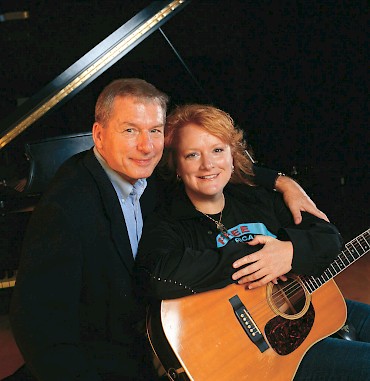 Amy Ray and Emily SaliersIndigo Girls have been in the music scene since the '80s, experimenting with their sound, enduring worldwide touring, and outlasting many of their female acoustic-based folk rock contemporaries. Amy Ray and Emily Saliers boast a long-lasting girlhood friendship, 16 albums, more than 35 years of writing, arranging, recording and performing together as a duo, and a Grammy for their self-titled album, which contains their signature song, “Closer to Fine,” featuring earnest lyrics and finely woven vocal harmonies delivered with equal parts fire and grace—a distinctive quality that longtime fans have come to cherish.
Amy Ray and Emily SaliersIndigo Girls have been in the music scene since the '80s, experimenting with their sound, enduring worldwide touring, and outlasting many of their female acoustic-based folk rock contemporaries. Amy Ray and Emily Saliers boast a long-lasting girlhood friendship, 16 albums, more than 35 years of writing, arranging, recording and performing together as a duo, and a Grammy for their self-titled album, which contains their signature song, “Closer to Fine,” featuring earnest lyrics and finely woven vocal harmonies delivered with equal parts fire and grace—a distinctive quality that longtime fans have come to cherish.
 Honor the Earth with Saliers, Ray and LaDukeSeparately, they’ve released solo albums and embarked on successful personal projects—Ray founded a record company and a nonprofit organization that promotes independent musicians, while Saliers scored a film, opened a restaurant and cowrote a book with her father. But their accomplishments have expanded because of the music they make together—and beyond it—into the realm of political activism. Indigo Girls’ commitment to social justice issues, humanitarian concerns and environmental causes can be heard in their musical themes and seen as personal action. Together with Winona LaDuke, Ray and Saliers founded the nonprofit Honor the Earth to raise awareness and financial support for indigenous environmental justice.
Honor the Earth with Saliers, Ray and LaDukeSeparately, they’ve released solo albums and embarked on successful personal projects—Ray founded a record company and a nonprofit organization that promotes independent musicians, while Saliers scored a film, opened a restaurant and cowrote a book with her father. But their accomplishments have expanded because of the music they make together—and beyond it—into the realm of political activism. Indigo Girls’ commitment to social justice issues, humanitarian concerns and environmental causes can be heard in their musical themes and seen as personal action. Together with Winona LaDuke, Ray and Saliers founded the nonprofit Honor the Earth to raise awareness and financial support for indigenous environmental justice.
While they’ve never been a couple, both Ray and Saliers have long identified themselves as lesbians. They are regarded as icons of the LGBTQ rights movement, dedicating tours, benefit concerts and festival performances towards the cause. One of the final frontiers of that cause is acceptance of the LGBTQ community into religious faith communities, and this is ground that Emily Saliers has covered in her own life and in her own family.
 Reverend Don and Emily SaliersReverend Don Saliers, Emily’s father, is an accomplished musician, composer, theologian, liturgical scholar, and United Methodist pastor. In their 2006 cowritten book, A Song to Sing, A Life to Live: Reflections on Music as Spiritual Practice discusses the idea of attentive listening—being able to appreciate the diversity that music provides in both sacred and secular settings. A telling quote from Rabbi Abraham Heschel appears in the book’s acknowledgements: “The shattering experience of music has been a challenge to my thinking on ultimate issues.” In the same way, the Saliers family’s love of music and desire to listen has helped them to explore their faith and bridge their beliefs.
Reverend Don and Emily SaliersReverend Don Saliers, Emily’s father, is an accomplished musician, composer, theologian, liturgical scholar, and United Methodist pastor. In their 2006 cowritten book, A Song to Sing, A Life to Live: Reflections on Music as Spiritual Practice discusses the idea of attentive listening—being able to appreciate the diversity that music provides in both sacred and secular settings. A telling quote from Rabbi Abraham Heschel appears in the book’s acknowledgements: “The shattering experience of music has been a challenge to my thinking on ultimate issues.” In the same way, the Saliers family’s love of music and desire to listen has helped them to explore their faith and bridge their beliefs.
Saliers collaborates with her father Don in performing for special groups and causes, the most recent of which is an Indigo Girls benefit concert in Portland on May 13 at First Congregational United Church of Christ, which purposefully coincides with the 2016 United Methodist General Conference. United Methodists from across the globe gather in Portland May 10–20, and delegates will be determining how the denomination ministers to gay, lesbian, bisexual and transgender people—and whether or not to end discrimination against LGBTQ people in the United Methodist Church.
Reconciling Ministries Network is presenting the concert in collaboration with Basic Rights Oregon and First Congregational Church UCC Portland to raise awareness and funds to support LGBTQ justice and inclusion in the United Methodist Church and society at large. Matt Berryman (RMN's executive director) reached out to Reverend Saliers about the possibility of the Indigo Girls participating this year, and all the pieces fit into place.
 “We’ve talked about playing for the General Conference in support of Reconciling Ministries Network for a while,” Emily Saliers says, “but this was the year that Amy’s and my schedules lined up, and we thought it was a particularly timely occasion given the up-cropping of injustice aimed at members of the queer community, trans people specifically.”
“We’ve talked about playing for the General Conference in support of Reconciling Ministries Network for a while,” Emily Saliers says, “but this was the year that Amy’s and my schedules lined up, and we thought it was a particularly timely occasion given the up-cropping of injustice aimed at members of the queer community, trans people specifically.”
Reverend Saliers spoke about their family's treasured practice of listening to one another when at least one dinner a week was set aside so everyone could be respected and listened to by everyone else—a forum to settle disagreements and offer corrections and shared advice.
“By the time Emily came out to us, her sisters and her mom and I were already aware of things," he explains. "This is what I desire for the church—attentive listening and shared knowledge, instead of assumptions and projected fears. Not to mention disinformation.”
He describes listening with humane understanding as an art to be cultivated, “especially in this culture of hype, sound bites and suspicion that too often affects the churches.” Reverend Saliers acknowledges that the church in its legislative mode en masse is not a family, “so we must do the slow, difficult work of the art of listening and paying attention to real lives—over time.”
 Emily Saliers simply maintains that all the UMC has to ask is the question to answer all questions: What Would Jesus Do? “I do my best to live faithfully and live as much as possible in the teachings of equality and love, which from all I can ascertain, is what Jesus and all great prophets of faith stood and stand for.” She adds, “We live by example and the world gradually changes.”
Emily Saliers simply maintains that all the UMC has to ask is the question to answer all questions: What Would Jesus Do? “I do my best to live faithfully and live as much as possible in the teachings of equality and love, which from all I can ascertain, is what Jesus and all great prophets of faith stood and stand for.” She adds, “We live by example and the world gradually changes.”
Both father and daughter connect to their spirituality and each other through music and listening—by extension, and now with daughters of their own, Indigo Girls continue to live by example in word, deed and song.




